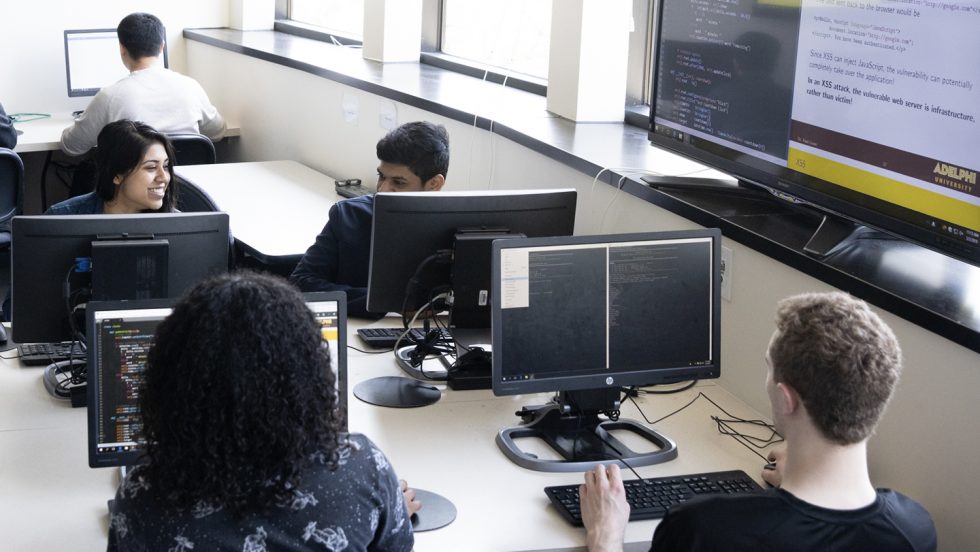
The physical world can present challenges to those with disabilities. So can the online world. That's why in the Accessible Computing Seminar, taught by Robert Siegfried, PhD, professor of mathematics and computer science, students learn how to use their programming skills to accommodate everyone.
Computer science graduate students aren’t often found doing class assignments around the campus green. Their field work is generally conducted in front of a screen, not in anything resembling an outdoor field. But students in the Accessible Computing Seminar, taught by mathematics and computer science professor Robert Siegfried, PhD, are sent outside for a session to look for examples of accommodations for people who have limited abilities, and for places where adjustments might be needed.
It’s part of Dr. Siegfried’s approach to teaching accessible design as an everyday and universal concern rather than a special interest. He notes that Adelphi generally does well on the assessments, but on occasion his students find room for improvement.
This isn’t just on physical infrastructure. Dr. Siegfried and his students examine webpages to see how accessible they are to people with disabilities and have devised a scripting language for those with visual impairments. He also uses experiences from his own life to help students realize that social awareness is a skill that needs to be developed.
Dr. Siegfried’s aunt lost her eyesight to glaucoma when he was young. She had a TV with a very simple remote control long before they were commonplace and held the wall while walking. She never used a cane and never had a Seeing Eye dog. To young Robert, she was just “Aunt Molly” who talked baseball with him, even if—as he later realized—she could only listen to the games.
“One thing I should have picked up but I didn’t is that she was the only person I knew who lived in a residential hotel,” he said. “It was only when I was a little older that I found out she was blind.”
The class was first offered in Spring 2020 as an elective for students getting their MS in Computer Science. Dr. Siegfried doesn’t give exams in the class. Instead, he and his students discuss such issues as prosthetic limb design, ADA compliance and universal design that accommodates both older adults and those with disabilities. For example, in the physical world, this includes wheelchair ramps, raised lettering for room numbers that can be read by the sighted and felt and recognized by those with visual impairments, and accessible theater seating. In the digital world, this can mean websites that don’t just accommodate but are built from the outset to give an equal user experience to those who can’t see or hear the content.
Then he has students write what he calls “reflective papers.” Students are also required to give class presentations that include the visually impaired and design a universal website. The goal, he said, is to give students a “real-world sensibility” that engineers don’t always display.
“If you look at this in terms of computer science in the strict sense of the term, you really miss out on what people need,” Dr. Siegfried said.
Legal liabilities
The COVID-19 pandemic has only intensified the issue. Agencies such as the Department of Motor Vehicles have pushed users online to fill out forms. Doing so without making sure the services can be used by everyone amounts to discrimination, he said. It’s a growing concern, but not one reflected in many degree programs. Dr. Siegfried said he only knew of a few other universities offering full courses in design accessibility.
Kees Leune, PhD, assistant professor of mathematics and computer science, who specializes in cybersecurity, said that the course provides an important angle in considering the many ways in which the internet is used and who those users are.
“Accessible computing concerns itself with making computers and computer-based resources available to all people, regardless of physical or neurological ability or impairment,” he said. “Adelphi University’s computer science program prides itself on its efforts toward improving accessibility and inclusion and decided to include a dedicated course in accessible computing. While programs at other institutions occasionally include references to accessible computing in some of their courses, Adelphi University is one of only a handful of colleges who decided to dedicate an entire 3-credit semester-long course to the subject. Student feedback has been overwhelmingly positive.”
While the web has become infinitely more accessible in the last 10 years, it’s far from an equal playing field. And what was once seen as optional, according to Dr. Siegfried, could now result in a lawsuit if companies and designers don’t make their sites available to all.
“You can’t work under the assumption anymore that web access is different from everything else you do,” he said. “Not having an accessible website, for a company, is a huge black eye.”